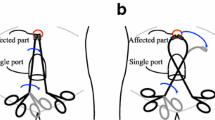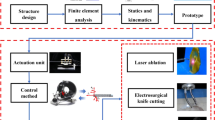Abstract
Purpose
Gastrointestinal cancer can be treated using a flexible endoscope through a natural orifice. However, treatment instruments with limited degrees of freedom (DOFs) require a highly skilled operator. Articulated devices useful for endoluminal procedures, such as endoscopic submucosal dissection and biopsy, have been developed. These devices enable dexterous operation in a narrow lumen; however, they suffer from limitations such as large size and high cost. To overcome these limitations, we developed a 2.5-mm articulated forceps that can be inserted into a standard endoscope channel based on a compliant mechanism.
Methods
The compliant mechanism allows the device to be compact and affordable, which is possible due to its monolithic structure. The proposed mechanism consists of two segments, 1-DOF grasping and 2-DOF bending, that are actuated by tendon-sheath mechanisms. A prototype was designed based on finite element analysis results.
Results
To confirm the effectiveness of the proposed mechanism, we fabricated the prototype using a 3D printer. A series of mechanical performance tests on the prototype revealed that it achieved the following specifications: (1) DOF: 1-DOF grasping + 2-DOF bending, (2) outer diameter: 2.5 mm, (3) length of the bending segment: 30 mm, and (4) range of motion: \(0^{\circ }\) to \(20^{\circ }\) (grasping) and \(-\,90^{\circ }\) to \(+\,90^{\circ }\) (bending). Finally, we performed a tissue manipulation test on an excised porcine colon and found that a piece of mucous membrane tissue was successfully resected using an electric knife while being lifted with the developed forceps.
Conclusion
The results of the evaluation experiment demonstrated a positive feasibility of the proposed mechanism, which has a simpler structure compared to those of other conventional mechanisms; furthermore, it is potentially more cost-effective and is disposable. The mechanical design, prototype implementation, and evaluations are reported in this paper.









Similar content being viewed by others
References
Diana M, Chung H, Liu KH, Dallemagne B, Demartines N, Mutter D, Marescaux J (2013) Endoluminal surgical triangulation: overcoming challenges of colonic endoscopic submucosal dissections using a novel flexible endoscopic surgical platform: feasibility study in a porcine model. Surg Endosc 27(11):4130–4135
Legner A, Diana M, Halvax P, Liu YY, Zorn L, Zanne P, Nageotte F, Mathelin MD, Dallemagne B, Marescaux J (2017) Endoluminal surgical triangulation 2.0: A new flexible surgical robot. Preliminary pre-clinical results with colonic submucosal dissection. Int J Med Robot Comput Assist Surg 13(3):e1819
Phee SJ, Low SC, Sun ZL, Ho KY, Huang WM, Thant ZM (2008) Robotic system for no-scar gastrointestinal surgery. Int J Med Robot Comput Assist Surg 4(1):15–22
Chiu PW, Phee SJ, Bhandari P, Sumiyama K, Ohya T, Wong J, Poon CCY, Tajiri H, Nakajima K, Ho KY (2015) Enhancing proficiency in performing endoscopic submucosal dissection (ESD) by using a prototype robotic endoscope. Endosc Int Open 3:439–442
Kume K, Sakai N, Ueda T (2019) Development of a novel gastrointestinal endoscopic robot enabling complete remote control of all operations: endoscopic therapeutic robot system (ETRS). Gastroenterol Res Pract 2019:6909547
Hwang M, Kwon DS (2020) K-FLEX: a flexible robotic platform for scar-free endoscopic surgery. Int J Med Robot Comput Assist Surg 16(2):e2078
Poon CCY, Yang H, Lau KC, Xu WJ, Yam Y, Lau JYW, Chiu PWY (2014) A bio-inspired flexible robot with hybrid actuation mechanism for endoscopic surgery. In: Proceedings of 2014 Hamlyn symposium on medical robotics, HSMR2014, pp 81–82
Berthet-Rayne P, Gras G, Leibrandt K, Wisanuvej P, Schmitz A, Seneci CA, Yang GZ (2018) The i2 Snake robotic platform for endoscopic surgery. Ann Biomed Eng 46(10):1663–1675
Abbott DJ, Becke C, Rothstein RI, Peine WJ (2007) Design of an endoluminal NOTES robotic system. In: Proceedings of 2007 IEEE/RSJ international conference on intelligent robots and systems, IROS2007, pp 410–416
Suzuki N, Hattori A, Tanoue K, Ieiri S, Konishi K, Tomikawa M, Kenmotsu H, Hashizume M (2010) Scorpion shaped endoscopic surgical robot for NOTES and SPS with augmented reality functions. In: Proceedings of the 5th international workshop on medical imaging and augmented reality, MIAR2010, pp 541–550
Schuler PJ, Hoffmann TK, Veit JA, Rotter N, Friedrich DT, Greve J, Scheithauer MO (2017) Hybrid procedure for total laryngectomy with flexible robot-assisted surgical system. Int J Med Robot Comput Assist Surg 13(2):e1749
Swanstrom LL, Kozarek R, Pasricha PJ, Gross S, Birkett D, Park PO, Saadat V, Ewers R, Swain P (2005) Development of a new access device for transgastric surgery. J Gastrointest Surg 9(8):1129–1136
Thompson CC, Ryou M, Soper NJ, Hungess ES, Rothstein RI, Swanstrom LL (2009) Evaluation of a manually driven, multitasking platform for complex endoluminal and natural orifice transluminal endoscopic surgery applications (with video). Gastrointest Endosc 70(1):121–125
Fuchs KH, Se BWJ (2012) Transgastric small bowel resection with the new multitasking platform EndoSAMURAI for natural orifice transluminal endoscopic surgery. Gastrointest Endosc 26(8):2281–2287
Seneci CA, Shang J, Yang GZ (2014) Design of a bi-manual endo-effector for an endoscopic surgical robot. In: Proceedings of 2014 Hamlyn symposium on medical robotics, HSMR2014, pp 83–84
Zizer E, Roppenecker D, Helmes F, Hafner S, Krieger Y, Lüth T, Meining A (2016) A new 3D-printed overtube system for endoscopic submucosal dissection: first results of a randomized study in a porcine model. Endoscopy 48(8):762–765
Vrielink TJO, Zhao M, Darzi A, Mylonas GP (2018) ESD CYCLOPS: a new robotic surgical system for GI surgery. In: Proceedings of 2018 IEEE international conference on robotics and automation, ICRA2018, pp 150–157
Lee DS, Kim JW, Lee KL, Kim BG, Kim SH, Byeon JS (2020) Technical feasibility of a newly designed bendable forceps for difficult endoscopic tissue samplings (with video). Surg Endosc 34(10):4692–4701
Kawahara T, Matsumoto T, Muramatsu N, Osada T, Sakamoto N, Arai F (2010) Development of a decoupling wire driven exoskeletal microarm for endoscopic submucosal dissection. In: Proceedings of the 3rd IEEE RAS and EMBS international conference on biomedical robotics and biomechatronics, BioRob2010, pp 849–854
Prasai AB, Jaiprakash A, Pandey AK, Crawford R, Roberts J, Wu L (2016) Design and fabrication of a disposable micro end effector for concentric tube robots. In: Proceedings of the 14th international conference on control, automation, robotics and vision, ICARCV2016
Nakadate R, Nakamura S, Moriyama T, Kenmotsu H, Oguri S, Arata J, Uemura M, Ohuchida K, Akahoshi T, Ikeda T, Hashizume M (2015) Gastric endoscopic submucosal dissection using novel 2.6-mm articulating devices: an ex vivo comparative and in vivo feasibility study. Endoscopy 47(9):820–824
Okamoto Y, Nakadate R, Nakamura S, Arata J, Oguri S, Moriyama T, Esaki M, Iwasa T, Ohuchida K, Akahoshi T, Ikeda T, Kitazono T, Hashizume M (2019) Colorectal endoscopic submucosal dissection using novel articulating devices: a comparative study in a live porcine model. Surg Endosc 33(2):651–657
Nakadate R, Iwasa T, Onogi S, Arata J, Oguri S, Okamoto Y, Akahoshi T, Eto M, Hashizume M (2020) Surgical robot for intraluminal access: an ex vivo feasibility study. Cyborg Bionic Syst, Article ID 8378025
Ray NA, Kwiat D, Rogers S, Lin MYC (2017) Lowering the barrier of surgical endoscopy with a novel articulating retractor. J Med Devices 11(3)
Howell LL (2001) Compliant mechanisms. Wiley-Interscience, Hoboken
Arata J, Kogiso S, Sakaguchi M, Nakadate R, Oguri S, Uemura M, Byunghyun C, Akahoshi T, Ikeda T, Hashizume M (2015) Articulated minimally invasive surgical instrument based on compliant mechanism. Int J Comput Assist Radiol Surg 10:1837–1843
Arata J, Fujisawa Y, Nakadate R, Kiguchi K, Harada K, Mitsuishi M, Hashizume M (2019) Compliant four degree-of-freedom manipulator with locally deformable elastic elements for minimally invasive surgery. In: Proceedings of the IEEE international conference on robotics and automation, ICRA2019, pp 2663–2669
Nokata M, Ichiraku K (2018) Design and production method of diameter 1mm ONE PART grasping forceps for catheter. In: Proceedings of the 29th international symposium on micro-nanomechatronics and human science, MHS2018, pp 238–240
Culmone C, Henselmans PWJ, van Starkenburg RIB, Breedveld P (2020) Exploring non-assembly 3D printing for novel compliant surgical devices. PLoS ONE 15:e0232952
Chandrasekaran K, Thondiyath A (2017) Design of a two degree-of-freedom compliant tool tip for a handheld powered surgical tool. J Med Devices 11(1)
Sun Y, Liu Y, Xu L, Zou Y, Faragasso A, Lueth T (2020) Automatic design of compliant surgical forceps with adaptive grasping functions. IEEE Robot Autom Lett 5(2):1095–1102
Sun Y, Liu Y, Lueth TC (2022) Optimization of stress distribution in tendon-driven continuum robots using fish-tail-inspired method. IEEE Robot Autom Lett 7(2):3380–3387
Sun Y, Zhang D, Liu Y, Lueth TC (2020) FEM-based mechanics modeling of bio-inspired compliant mechanism for medical applications. IEEE Trans Med Robot Bionics 2(3):364–373
Osawa K, Bandara DSV, Nakadate R, Nagao Y, Akahoshi T, Eto M, Arata J (2022) Stress dispersion design in continuum compliant structure toward multi-DOF endoluminal forceps. Appl Sci 12(5)
Park C, Park S, Hong H, Jeon IH, Kim K (2018) Development of an end-effector device for loose body removal in hip arthroscopy. Proc Inst Mech Eng Part H J Eng Med 232(10):987–998
Funding
This work was supported by JST SPRING (grant number JPMJSP2136).
Author information
Authors and Affiliations
Corresponding author
Ethics declarations
Conflict of interest
The authors declare that they have no conflict of interest.
Ethical approval
All applicable international, national, and institutional guidelines for the care and use of animals were followed.
Informed consent
This article does not contain patient data.
Additional information
Publisher's Note
Springer Nature remains neutral with regard to jurisdictional claims in published maps and institutional affiliations.
Rights and permissions
Springer Nature or its licensor holds exclusive rights to this article under a publishing agreement with the author(s) or other rightsholder(s); author self-archiving of the accepted manuscript version of this article is solely governed by the terms of such publishing agreement and applicable law.
About this article
Cite this article
Osawa, K., Bandara, D.S.V., Nakadate, R. et al. 2.5-mm articulated endoluminal forceps using a compliant mechanism. Int J CARS 18, 1–8 (2023). https://doi.org/10.1007/s11548-022-02726-9
Received:
Accepted:
Published:
Issue Date:
DOI: https://doi.org/10.1007/s11548-022-02726-9




